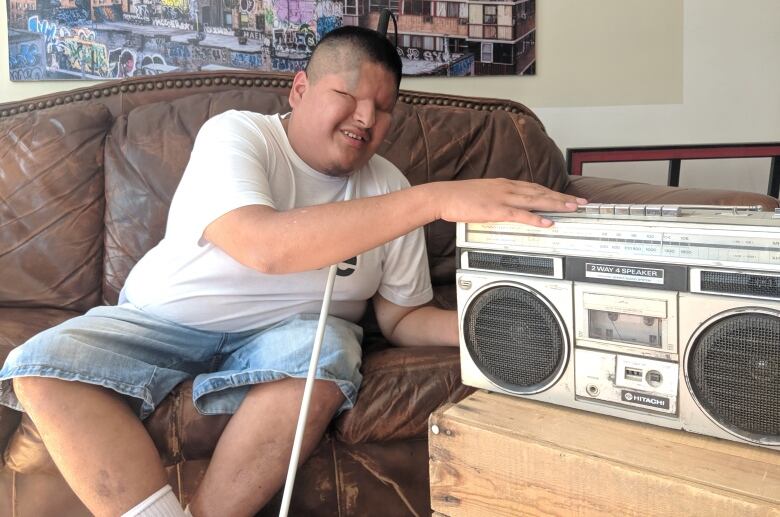Meet Mattmac, the blind Oji-Cree artist who writes, raps and produces his own music
[ad_1]
From small gospel jamborees on the rez to the bright lights of the big city, one self-taught, blind Oji-Cree artist is hoping his music will break down barriers for other young people with disabilities.
“I obviously have a disability. I’m blind, but I’ve never let that stop me,” said Matthew Monias, 20, a.k.a. Mattmac.
“I’ve been putting in my time and effort into this project and everything that’s going on.”
Monias, who was born blind, grew up in the Oji-Cree community of Garden Hill, about 475 kilometres north of Winnipeg.
He grew up in a gospel music environment with his family and started singing at the age of four.
“That’s kind of what really started my musical journey. I used to sing a lot and it was mostly gospel music that I was doing in the community,” he said.
When he was eight, he discovered that not everyone was living like him.
“That’s when it really started hitting me, the fact that I had no vision and I was different from everybody else,” he said.

Monias said he has never let his disability deter him from learning how to play piano, guitar and drums, and to sing, write and eventually produce all of his own music.
“I’m completely self-taught,” he said.
“I’ve had pointers given to me here and there about [digital audio workstations]… about music theory… but most of my skill is self taught.”
When he was 16, N’we Jinan — a non-profit organization that visits Indigenous communities across the country to help produce songs and accompanying music videos — visited Garden Hill.
The group recorded a song called Help You See, and Monias used the time the organization spent in his community to learn as much as he could about the music technology they were using.
David Hodges, the founder of N’we Jinan, said Monias is one of the first artists for his new social enterprise, N’we Jinan Records.
“He’s got that professional sound that he’s created himself. He’s created his own sound and that’s hard to achieve at an early stage,” said Hodges.
With the new project, Hodges hopes to continue supporting Monias’s talent development as an artist as well as the business side of the industry.
Making use of assistive technology
Over the past five years, Monias has learned to navigate the internet using assistive technology that he uses converts text to speech.
He said the technology continues to improve and that he uses it to navigate all of his social media platforms and apps that he uses to produce music.

Monias said that he has been able to push further in his career thanks to an internet collective called Blind and Famous. He said that it’s a group across North America that support each other.
“There’s some of us who can rap, most of them are producers, songwriters and recording artists,” he said.
“I take inspiration from them a lot. I credit them for most of my success.”
Even though he is blind, Monias said the biggest challenge of being a music artist in a fly-in First Nation is the slow internet.
“My main platform is the internet right now,” he said.
“The internet connection isn’t the best out there so that kind of gets in the way of things when it comes to collaborating with people or getting things uploaded or getting things downloaded for collaborations.”
Over the past year, he has collaborated with hip-hop veteran Drezus on a song called Play the Hero.
“MattMac’s talent is out of this world,” said Drezus, also known as Jeremiah Manitopyes.
“I didn’t know what to expect but when I first heard his voice and his beat, knowing that he made the beat himself and mixed the track himself, along with the way his voice sounded, it blew me away,” he said.
Monias’s song Paradise is in this week’s top 10 of the Indigenous Music Countdown, a program run by Manitoba radio station Native Communications Incorporated, and will be the first official music video that he has released.
For Monias, being able to shoot a video in the city was exciting.
“It’s something that I’ve been dreaming of, coming out to the city, being able to shoot my music video for something that I produced,” said Monias.
He said he hopes that his work will help inspire not only young people with disabilities, but also people living in First Nations across the country.
“I’m going to take this as far as I can.”
[ad_2]
SOURCE NEWS
